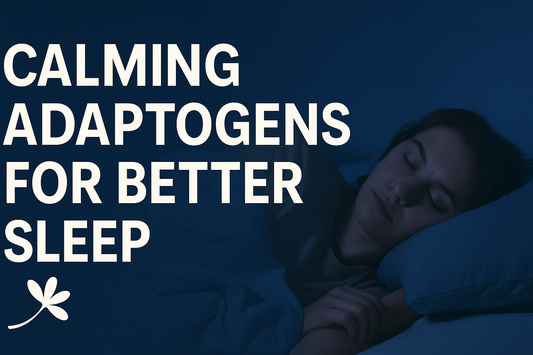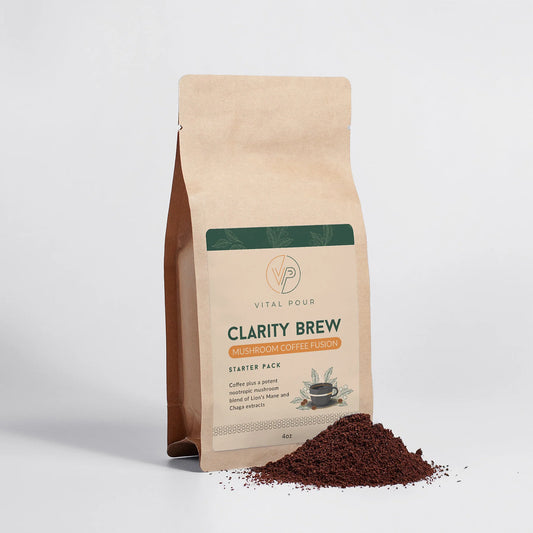If you’re tossing and turning at night, unable to quiet your mind or relax your body, you’re not alone.
Millions of people deal with poor sleep caused by stress, anxiety, and overstimulation from modern life. While over-the-counter sleep aids exist, many come with unwanted side effects or grogginess the next day.
That’s why more and more people are turning to natural sleep remedies, especially calming adaptogens - plants and mushrooms that help your body manage stress and restore balance.
Unlike sedatives, these herbs work by calming the nervous system, regulating stress hormones like cortisol, and helping you unwind naturally.
In this guide, you’ll discover how adaptogens like Ashwagandha, Reishi, and Holy Basil can improve your sleep quality, support your stress response, and help you wake up feeling truly refreshed.
The Stress-Sleep Connection: Why We Struggle to Rest

Stress is a primary culprit behind poor sleep. When we are stressed, our Hypothalamic-Pituitary-Adrenal (HPA) axis becomes activated, leading to the release of cortisol.
While cortisol is essential for waking us up in the morning and managing acute stressors, chronically elevated levels, especially in the evening, can wreak havoc on our sleep cycle:
-
Difficulty Falling Asleep: High evening cortisol can leave you feeling "wired and tired," making it hard to wind down and drift off.
-
Frequent Waking: Cortisol imbalances can lead to waking up during the night, often with a racing mind.
-
Poor Sleep Quality: Even if you manage to sleep, stress can prevent you from reaching the deeper, more restorative stages of sleep, leaving you feeling unrefreshed in the morning.
-
Anxiety and Racing Thoughts: Stress often fuels anxiety and a cascade of thoughts that can keep you tossing and turning.
How Calming Adaptogens Promote Better Sleep
Calming adaptogens work to improve sleep not by acting as direct sedatives (like many sleep medications), but by addressing the underlying physiological imbalances caused by stress:
1. Regulating Cortisol Levels: They help to normalize the HPA axis and lower elevated evening cortisol levels, signaling to your body that it's time to rest.
2. Soothing the Nervous System: Many calming adaptogens have a direct quieting effect on the nervous system, reducing feelings of anxiety and promoting relaxation.
3. Enhancing GABA Activity: Some adaptogens may increase the activity of Gamma-Aminobutyric Acid (GABA), an inhibitory neurotransmitter that calms brain activity and promotes relaxation.
4. Improving Stress Resilience: By helping your body adapt to stress more effectively during the day, adaptogens can reduce the carry-over of stress into the nighttime hours.
5. Supporting Overall Balance: They contribute to a state of homeostasis, which is conducive to healthy sleep-wake cycles.
Key Calming Adaptogens for Restful Nights

Several adaptogens are particularly renowned for their ability to support sleep quality:
Ashwagandha (Withania somnifera):
-
How it helps sleep: Ashwagandha is perhaps the most well-known adaptogen for stress and sleep. It helps reduce cortisol levels, calms the nervous system, and has been shown in studies to improve sleep quality, reduce the time it takes to fall asleep, and lessen anxiety. It contains triethylene glycol, which may contribute to its sleep-inducing properties.
-
Best for: Individuals experiencing stress-related insomnia, anxiety at bedtime, or feeling "wired but tired."
-
Usage tip: Often taken in the evening, about an hour or two before bed.
Reishi Mushroom (Ganoderma lucidum):
-
How it helps sleep: Reishi is deeply calming and has a long history of use for promoting relaxation and restful sleep. It supports the HPA axis, helps to quiet an overactive mind, and can improve sleep duration and quality. It’s not a sedative but rather helps the body settle into a natural sleep state.
-
Best for: Those with difficulty winding down, an overactive mind at night, or stress-induced sleep disturbances.
-
Usage tip: Can be taken as a tea or extract in the evening.
Holy Basil (Tulsi - Ocimum tenuiflorum):
-
How it helps sleep: Holy Basil is revered for its ability to reduce stress, calm the mind, and promote a sense of well-being. By mitigating the effects of stress, it can indirectly support better sleep. It also has antioxidant and anti-inflammatory properties that contribute to overall health.
-
Best for: Individuals whose sleep is disrupted by daily stress and anxiety.
-
Usage tip: Can be enjoyed as a calming tea in the evening or taken as an extract.
Lemon Balm (Melissa officinalis) - Often Paired with Adaptogens:
-
How it helps sleep: While not strictly an adaptogen itself, Lemon Balm is a well-known calming herb often used alongside adaptogens for sleep. It has nervine properties, helps reduce anxiety, promotes relaxation, and can improve sleep quality, particularly when sleep issues are related to nervousness or restlessness. It may enhance GABA activity.
-
Best for: Mild insomnia, restlessness, and anxiety-related sleep problems.
-
Usage tip: Commonly taken as a tea or tincture before bed.
Valerian Root (Valeriana officinalis) - A Nervine Sedative, Not an Adaptogen:
-
How it helps sleep: It's important to distinguish Valerian. It's a powerful nervine and mild sedative, not an adaptogen. It is well-researched for improving sleep latency (time to fall asleep) and sleep quality, likely by increasing GABA in the brain. It is more directly sedative than adaptogens.
-
Best for: Difficulty falling asleep, frequent waking. Often used for more pronounced insomnia.
-
Usage tip: Taken 30 minutes to 2 hours before bedtime. Can cause drowsiness; avoid operating machinery. Some people experience a paradoxical stimulating effect.
Chamomile (Matricaria chamomilla or Chamaemelum nobile) - Gentle Calming Herb:
-
How it helps sleep: Like Lemon Balm, Chamomile is a gentle calming herb, not an adaptogen. It's widely used to promote relaxation and reduce mild anxiety, making it easier to fall asleep. Its effects are attributed to compounds like apigenin.
-
Best for: Mild sleep difficulties, promoting relaxation before bed.
-
Usage tip: Popular as a bedtime tea.
Creating a Sleep-Supportive Routine with Adaptogens

Incorporating calming adaptogens into your evening routine can significantly enhance their sleep-promoting effects:
-
Consistency is Key: Take your chosen adaptogen(s) regularly, as their benefits often build over time.
-
Timing Matters: Take calming adaptogens 1-2 hours before your desired bedtime to allow them to start working.
-
Mindful Consumption: Consider making a ritual out of taking your adaptogen, such as sipping a warm Reishi or Holy Basil tea, to signal to your body that it's time to wind down.
-
Combine with Sleep Hygiene: Adaptogens work best when paired with good sleep hygiene practices:
-
Maintain a regular sleep schedule (go to bed and wake up around the same time daily).
-
Create a dark, quiet, and cool sleep environment.
-
Avoid caffeine and heavy meals close to bedtime.
-
Limit blue light exposure from screens (phones, computers, TV) in the evening.
-
Engage in relaxing activities before bed, like reading, a warm bath, or gentle stretching.
Safety and Considerations
Consult a Healthcare Professional: If you have chronic insomnia, underlying health conditions, are pregnant or breastfeeding, or are taking any medications (especially sedatives or psychiatric medications), consult with your doctor or a qualified herbal practitioner before using adaptogens or other herbs for sleep.
Start with Single Herbs/Adaptogens: This helps you identify what works best for you and pinpoint any potential sensitivities.
Dosage: Follow product recommendations or guidance from a practitioner.
🌙 Wind Down the Natural Way - With Vital Pour Mushroom Coffee Fusion
Looking for a gentle, adaptogenic blend to help ease your body into rest?
Vital Pour’s Mushroom Coffee Fusion combines the power of Lion’s Mane and Chaga with smooth, low-acid coffee - offering a focused boost during the day without the crash that disrupts your sleep cycle.
It’s the perfect addition to your daily wellness routine to help reduce stress, support your nervous system, and create a calm foundation for deeper sleep at night.
✅ Organic, lab-tested mushrooms
✅ Smooth, balanced energy
✅ Naturally rich in antioxidants & adaptogens
👉 Try it now and feel the difference a smarter cup of coffee can make - for your focus and your sleep.
Conclusion:
If stress and anxiety are keeping you from the restorative sleep you need, calming adaptogens offer a natural and supportive path to better rest.
By helping to regulate your body’s stress response and soothe your nervous system, adaptogens like Ashwagandha, Reishi, and Holy Basil can pave the way for more peaceful nights and energized days.
Paired with good sleep hygiene, they can be a valuable tool in your journey to overcome insomnia and reclaim the profound benefits of quality sleep.


